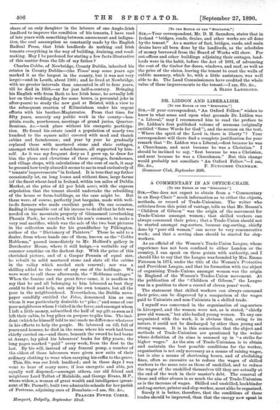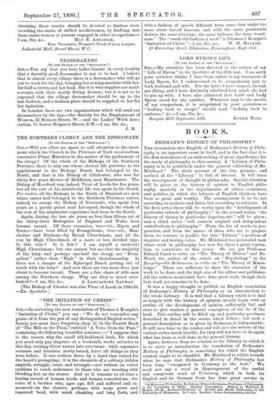A COMMENTARY IN AN OFFICE-CHAIR.
[To THE EDITOR OF THE "SPECTATOR."] SIR,—One does not expect to obtain from a "Commentary in an Easy-Chair" much information as to either the objects, methods, or record of Trade-Unionism. The writer who criticises from this point of vantage, tells us that Mr. Besant's- " Children of Gibeon " was the origin, of the movement for Trade-Unions amongst women ; that skilled workers can always command their price ; that a Trade-Union should, not be started amongst rag-sorters, because rag-sorting, chiefly done by "poor old women," can never be very remunerative work; and that a sewing class should be started for slop- workers.
As an official of the Women's Trade-Union League, whose experience has not been confined to either London or the country, I can speak on these points with authority, and I should like to say that the League was founded by Mrs. Emma Paterson in 1874, under the title of the Women's Protective and Provident League, and that its formation with the object of organising Trade-Unions amongst women was the origin in England of the Women's Trades-Union movement. At the publication of the "Children of Gibeon," the League- was in a position to show a record of eleven years' work.
The statement that skilled workers can always command their price, can be disproved by a comparison of the wages paid to Unionists and non-Unionists in a skilled trade.
I myself was concerned in the organisation of rag-sorters in Liverpool, and the women were not, as is stated, "chiefly poor old women," but able-bodied young women. To any one acquainted with the work, it is obvious that, owing to its nature, it could not be discharged by other than young and strong women. It is in this connection that the object and methods of Trade-Unionism are questioned by the writer whose definition of its aims is summed up in "a strike for higher wages." As the aim of Trade-Unionism is to obtain and maintain the best possible conditions for the worker, organisation is not only necessary as a means of raising wages, but is also a means of shortening hours, and of abolishing fines, often so excessive as to reduce the wages of skilled workers to the same rate as those of unskilled, and to reduce the wages of the unskilled themselves till they are actually at the end of the week in their master's debt. The removal of these and other abuses is as much the aim of Trade-Unionism as is the increase of wages. Skilled and unskilled, bookbinder and rag-sorter, printer and slop-worker, must alike be organised.
Surely it is better, therefore, that the conditions of these trades should be improved, than that the energy now spent in
obtaining these results should be devoted to further over- crowding the ranks of skilled neecllewomen, by drafting into those ranks women at present engaged in other occupations.— Hon. Treasurer, Women's Trade-Union League. Indiustrial Hall, Broad Street, W.C.



































 Previous page
Previous page